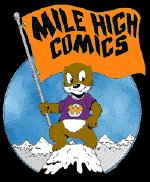Mile High II Collection Part I
|
Starting with this week's column, I'm going to tell you a long story about the best comics deal I ever made. Contrary to popular misconception, the Edgar Church collection was not my best-ever comics find. In fact, at the time that I closed the deal, the collection that I later dubbed the "Mile High II Collection" had a retail value that was over ten times the original value of the Mile High/Edgar Church collection! Aside from the significant financial effect the discovery of this larger collection had on the future of Mile High Comics, I think the story of the purchase of this collection is historically quite interesting. Others must agree, as it has been the #1 requested topic from the e-mails I've received from readers of this column. I have to warn you, however, that the story is not a pretty one. The comics were great, but the environment in which I made the deal was a sordid mix of sex, drugs, and family betrayals. It ended up being the best comics deal that I ever made, but it took a trip through the sewers to get the job done. I want to start the story by setting the stage for the purchase. February, 1985 was a bitter cold month in Denver. I was operating in those days in a mouse-infested 15,000 square foot warehouse, that was once home to Denver's first ballroom dancing arena. My tiny office had a huge mirrored window that faced the roar of traffic going down Broadway, the main north-south arterial in Denver. In addition to letting in the noise, that big window leaked cold air so badly that I frequently had to wear gloves while working at my desk. Aside from the physical chill, I spent many of the days that cold winter in psychic despair, as it was very much looking like my financial gamble of investing all the proceeds from the Edgar Church collection into Mile High Comics had been a huge mistake. As I mentioned in the Mile High I story last year, I sold off nearly all of the Edgar Church comics between 1977 and 1986. Initially I was just selling comics that I didn't particularly care for, but by 1981, I was selling off titles I really liked, such as the key Timely titles MYSTIC, DARING, and TOUGH KID SQUAD. Continuing my downward slide, in 1982, I was forced to sell ACTION #1-11 (all for $50,000...). In 1983, I was forced to let go of MARVEL MYSTERY #1-10 (also for $50,000), my favorite remaining key run. With the exception of the small Timely titles, each time I sold books I put 30% aside for taxes, and then deposited the balance of the funds into the Mile High checkbook. No matter what I did, however, it would all be gone in a couple of months. Then I'd be back to selling more of the Church books to keep the company going. By 1983, when the MARVEL MYSTERY issues were gone, I could see the end of the line coming up fast. I then had to make a harsh decision. I could no longer afford to fund all of Mile High Comics. Something had to go. The structure of Mile High Comics in those days was much as it is now. We had five retail stores, a mail order new comics subscription business, and a mail order back issue business. The first big financial crunch came during the Fall of 1982. At that time, I had one of those cool ideas that changed my life. Before going into comics dealing full time, I had studied Finance at the University of Colorado Business School. I remembered from my financial management classes that you could immediately book the profits from the sale of an asset to your corporation financial statement, even if the actual payments were not to be received for several years down the road. This became a critical question, as I badly needed to borrow money at that time, but (obviously) couldn't show any corporate earnings. To test my theory, I went to my banker, and asked him if he could loan me cash against a long-term receivable. He said that he most certainly could, as long as I had a signed promissory note. I immediately put my plan into effect by selling one of my stores to a former employee for $2,000 down (all of which I ended up loaning him...). I then took the resulting $50,000 10-year note to the bank, and it ended up being sufficient collateral for an immediate $30,000 loan! With that wonderful example as an incentive, I sold all my other stores over the next three years, and consequently found myself with only the mail order divisions of Mile High Comics remaining. While giving up my stores was in many regards heartbreaking (especially my first store in Boulder) I couldn't deny that it was very exciting to have, for the first time in my life, great borrowing capacity. To be continued... Please send your e-mails to chuck@milehighcomics.com, and your letters to:
Mile High Comics, Inc.
|
| Previous | Next |

